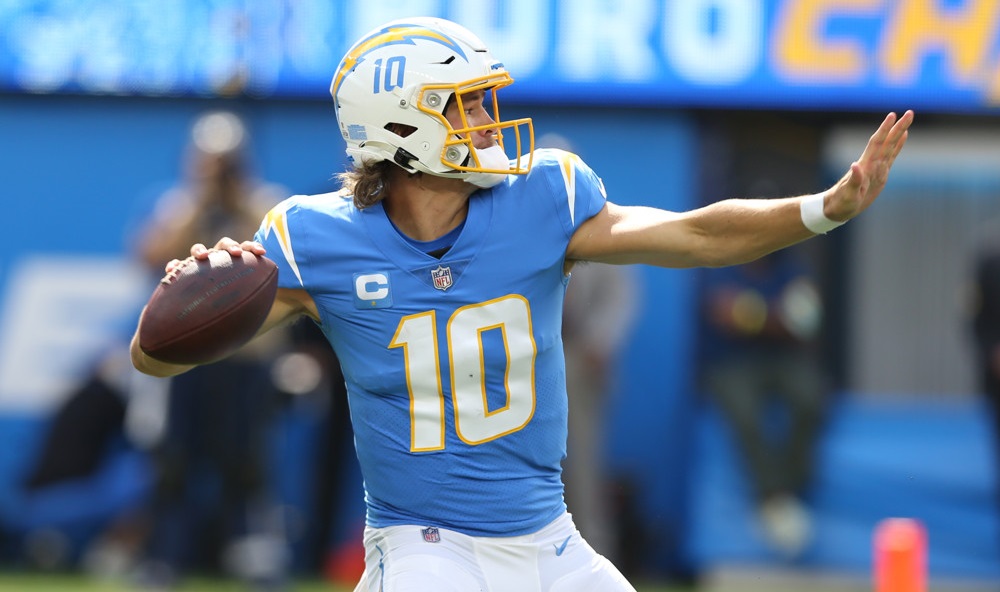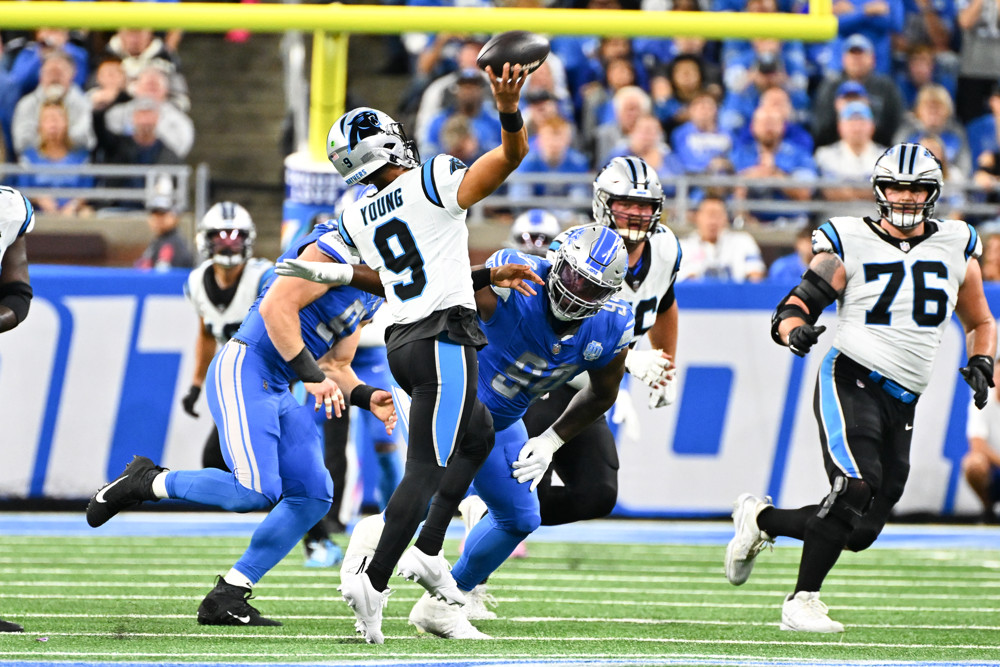The Lions are off to their best start in over a decade, and while that’s not saying much, there are plenty of reasons for their fans to be excited. At 6-2, they hold a two-game lead in the division and should cruise into the postseason if their remaining slate of games is to be believed; They have the 4th-easiest remaining strength of schedule by current opponent win percentage (42%), and the easiest by opponent defensive EPA. So, barring a complete meltdown, they should crack double-digit wins (which hasn’t happened since 2014), win the NFC North for the first time ever and return to the playoffs after a six-year drought. And if you don’t know any Lions fans, rest assured: that would be a very big deal for them.
But, people outside of the fanbase don’t care a whole lot about that. Sure, the head coach is adorable and watching a cursed franchise succeed gives most well-adjusted sports fans – if there is such a thing – the warm fuzzies, but people will never be satisfied and they’ll always want more, and that’s why most of us die with regrets. So, the existential question at hand becomes: are the Lions a legit contender?
The answer is a resounding ‘maybe.’
We’ve already covered the back half of their schedule, but it’s also worth noting that most of the teams they’ve played so far have, by NFL standards, sucked. Sure, they beat the Chiefs by a point when Kansas City 1) did not have Travis Kelce, 2) did not have Chris Jones, and 3) dropped 17% of their passes en route to one of the worst offensive performances in the Patrick Mahomes era, but, outside of that, do they really have a signature win? Ending the Baker Mayfield Comeback Player of the Year story arc? Sending Josh McDaniels – who was fired at 1 AM eastern time the day after the trade deadline, by the way – to hell? To borrow a college football term, they ain’t played nobody.
Furthermore, their games against the current NFC West and AFC North division leaders – the only teams on their schedule with winning records – both resulted in losses. The Seattle game at least could have gone either way, but the Baltimore game was a snuff film. That said, teams are entitled to learning experiences (i.e. horrible losses) and you can only beat who you play, so none of this is sufficient to pass judgment. It is, however, relevant because it muddies the waters a bit.
We could go a lot of different directions from here, but let’s start with Jared Goff. He’s received a lot of praise for his recent performance and is 4th in the league in passing yards, but his advanced statistical profile paints a very distinct picture of him as a game manager type.
He is by no means a playmaker; his expected on target rate +/- (xOnTgt+/-) – which measures whether or not a throw was accurate relative to factors like depth of target – is poor on both contested throws (-5%, 26th) and throws made off-platform or outside the pocket (-2%, 24th). He is, however, a relatively smooth operator from within structure.
He currently has the fifth-lowest turnover-worthy throw rate at 1.6%(a career best for him and about half his average in his last three Rams seasons), and he’s getting the ball out quickly with an expected snap to throw +/- of -0.2 seconds, which ranks 4th. Goff also manages the pocket well and doesn’t take a lot of sacks; he has the 4th-lowest sack rate in the league at 5% and the 7th-lowest pressure rate at 31%.
That is an unexciting, albeit useful player, and offensive coordinator Ben Johnson has done an excellent job of tailoring the passing game to Goff’s strengths, and that actually doesn’t entail a lot of play action like it did when Goff was in LA. They’re largely a dropback team and – like almost every NFL offense – they run just about every concept under the sun, but they have their preferred flavors. They spam the outside vertical stretch concepts (e.g. Smash), the intermediate high-lows (e.g. Dagger), and the weakside choice plays that Goff does so well on. Johnson has also designed a diverse screen game that they call upon often; the team has called the 5th-most screens in the NFL this year at an average of about 5 per game.
And all that has gone a surprisingly long way. Despite his limitations, Goff is 8th in passing Total Points/play and 5th in positive play rate (49%).
There are less talented, more mistake-prone quarterbacks with better statistical output (see: Tua Tagovailoa, Brock Purdy), but we haven’t yet stumbled upon the ‘quarterbacks don’t matter’ variant of hobbyist wage suppression masquerading as analytics, so it’s fair to wonder if you can win a Super Bowl with someone like Goff – especially when he doesn’t have the Space Jam supporting casts of the aforementioned, generic Shanahan quarterbacks.
He does have some pieces at his disposal, though. Amon-Ra St. Brown ranks 10th in Points Earned/Play (0.07), 8th in YPRR, and 8th in YAC, but he is a bit of an underneath merchant; his average depth of target (ADoT) ranks 127th out of 169 WRs/TEs with at least 10 targets. They’d surely like to be getting more downfield production out of 2022 first rounder Jameson Williams, but Josh Reynolds is picking up the slack with a league-best 96% first down catch rate, and Sam LaPorta is developing nicely.
The offensive line deserves its flowers, as well. Despite some injuries to that unit, they rank 11th in Blocking Points Earned/snap, and have gotten some excellent performance from their bookends. Right tackle Penei Sewell ranks 2nd in pass blocking Points Earned/snap, and left tackle Taylor Decker ranks 3rd in run Blocking Points Earned/snap. This is an athletic unit that can successfully execute a big menu of moving parts gap runs, and it stands to reason that the run game can improve from 10th in EPA/play and 13th in positive play rate if both the offensive line and the running backs can get healthy.
The defense has been serviceable as well this year. After a disastrous start to 2022 in which they were on pace to be the worst defense of the SIS era – yes, even worse than the 2020 unit led by Matt Patricia – they leveled out in the second half and have carried that into this season. They rank 11th in EPA/play allowed and they’ve seen encouraging growth from some of their younger players.
Rookie slot corner Brian Branch appears to be a star-in-the-making; he ranks 5th in Coverage Points Saved/play among corners with 10+ targets and 3rd in Run Defense Points Saved/play among all players with 50+ run down snaps. Second-year edge Aidan Hutchinson has likewise taken a leap and leads the league in pressures and ranks 20th in pressure rate +/-. Third-year corner Jerry Jacobs has also had something of a breakout year and ranks 12th among corners in Points Saved/play, though his historical performance might suggest he’s due for regression.
They have a few complementary pieces along the defensive line – Charles Harris is 20th in pressure rate among DL, and Alim McNeill is a pretty good pass rusher for a nose tackle – but the aforementioned players constitute the bulk of this team’s passing game impact. They do not, for example, have a linebacker who ranks better than 50th in Coverage Points Saved/play. If defense is a weak-link system, and it is, then there are reasons to be concerned about a Detroit back 7 that is mired by injuries to the secondary and shoddy coverage from its linebackers.
Their run defense has been good, but weird. They rank 11th in positive play rate and 2nd in explosive play rate, but 28th in stuff rate and 26th in broken/missed tackle rate. They don’t allow many positive runs, much less big ones, but they also don’t generate many negative plays and they also miss a lot of tackles. To their credit, they are a swarming unit so we might allow for some broken and missed tackles, but it’s fair to wonder if this holds up over the course of the season.
At the end of the day, this team feels like more than the sum of its parts. That’s a credit to Dan Campbell and the rest of the coaching staff, and it bodes well for the franchise that he was able to turn things around relatively quickly. That said, there are other NFC teams with more star power than them, and they’re pretty firmly outside of the triumvirate of leading NFC contenders (San Francisco, Philadelphia, Dallas). A Super Bowl is obviously the ceiling here, but it’s pretty unlikely within the distribution of their probabilities. Are they a contender? Maybe as a dark horse, and that’s fine. For younger Lions fans, this could be the best the team’s been in their lifetime. They haven’t won a playoff game since before I was born, and this looks like the year they’ll do it, Super Bowl be damned.


